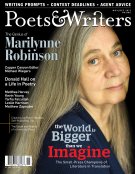To keep pace with the changing times, literary magazine editors must constantly rethink and revise their strategies for finding strong writers. For the latest issue of Black Warrior Review (bwr.ua.edu), the biannual from the creative writing MFA program at the University of Alabama in Tuscaloosa, the editors eschewed soliciting work from established writers and instead selected each piece (except for the chapbook included in the issue) from the slush pile. Issue 42.1 features fiction from Jessica Alexander, poetry from G. C. Waldrep, and more. “The work chosen in the issue reflects themes of personal mythology and the folklore of lineage—the stories we tell about and around family and familial history,” says editor Zachary Doss. The editors accept submissions of poetry, fiction, and nonfiction from December 1 to March 1 and from June 1 to September 1 online through Submittable.
Other journals, such as London-based quarterly Granta (granta.com), have diversified their contributor list by focusing on a different theme each issue and by adopting a global focus. Under the leadership of publisher and editor Sigrid Rausing, recent Granta issues have played with the idea of borders: Issue 131: The Map Is Not the Territory focuses on “the difference between the world as we see it and the world as it actually is,” and the latest offering, Issue 133: What Have We Done, explores “the environment and our destruction of both rural and urban landscapes,” including work from emerging Australian writer Rebecca Giggs on the death of a stranded whale, and poet Kathleen Jamie on the Alaskan wilderness. Granta accepts submissions of poetry, fiction, and nonfiction between October 1 and April 1 online via Submittable.
Another globally minded journal, Hong Kong–based quarterly Asia Literary Review (asialiteraryreview.com) recently emerged from a two-year hiatus to continue publishing writers of “the best contemporary writing from and about Asia, in English and in translation.” With financial support from new owners, editor Martin Alexander has curated work for the last few issues that reflects the high-quality design and varied content that first enthralled readers nearly a decade ago. The Fall 2015 issue features Paul French on the history of Shanghai rooftops, and Korean novelist Lee Eung-jun’s dystopic vision of a post-reunification Korea. As novelist Miguel Syjuco explains: “Without Asia Literary Review, it would be impossible, unless you had a really deep interest in a certain country, to read many of these authors. It has opened up a channel. It’s like the Panama Canal.” The Spring 2016 issue, due out next March, will focus on young writers from Korea. Submissions of poetry, fiction, nonfiction, and translation are accepted year-round by e-mail.
Portland, Oregon–based literary annual Burnside Review (burnsidereview.org) has taken a different approach to attracting a new set of writers. “We started charging a small submission fee, but also started paying all our contributors,” says editor Sid Miller. “We feel that if anything, it’s improved the work we receive.” Issue 11.1 features three new poems from Jennifer L. Knox alongside an interview with the poet by Dan Kaplan. Regarding submissions, the editors advise: “We like whiskey. We like hourglass figures. We like to be surprised. Surprise us.” Poetry and fiction are considered year-round via Submittable.
Finally, some editors find a tried-and-true formula and stick with it. Such is the case for the Scottish biannual the Dark Horse (thedarkhorsemagazine.com), which this past summer marked its twentieth anniversary of publishing poets from Britain, Ireland, and America. Having debuted as a small, hand-typeset journal, the Dark Horse now offers hundreds of pages of transatlantic poetry and criticism in each issue. Founder Gerry Cambridge notes in the introduction to the twentieth-anniversary issue, “Some things, of course, despite everything don’t change. I began the Horse as a forum for the best writing about poetry and the best poetry (by my own lights) I could find…. That is still how I see it.” The latest issue includes essays by Katy Evans-Bush on James Merrill and Kathryn Gray on the culture of poetry prizes. The Dark Horse welcomes submissions of poetry and criticism year-round by mail.
Travis Kurowski is the editor of Paper Dreams: Writers and Editors on the American Literary Magazine (Atticus Books, 2013). His website is traviskurowski.com.








